Do Preemies Sleep More Than Full-Term Babies?
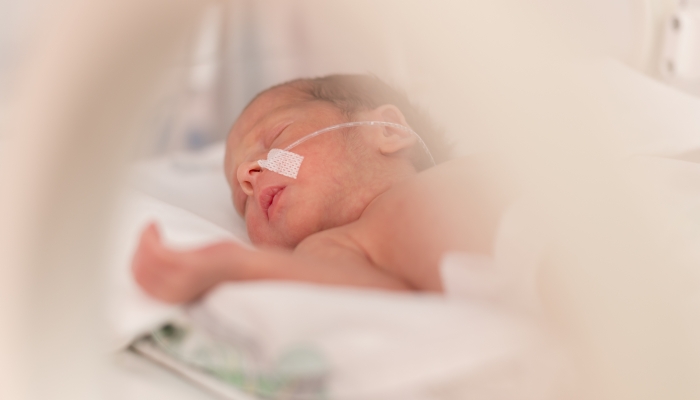
- Newborn babies are considered premature when they’ve been born before 37 weeks of gestation.
- A premature baby may sleep more than a full-term infant.
- Babies born early need more sleep in order to continue developing critical systems left immature.
- A preemie needs to be woken up at least every 4 hours to eat in order to gain the nutrients needed for growth.
- There’s no shortage of tips for helping your baby adjust to a sleep schedule.
The first time I held a preemie I remember feeling like a bull in a china shop. He was so small and felt so fragile; I barely moved for fear of somehow disturbing his sleep further. I say further because for such a tiny being he could really squirm. At the time I didn’t know how much preemies actually slept or that their sleep was so easily disturbed.
Let’s just say, he made a quick learner out of me! In the United States every 1 in 10 babies are born prematurely, making it more common than most realize. Their need for sleep and difficulties doing so are also elements that go widely unrecognized.
Do preemies sleep more than your average baby? Whether you’re here as the new parents of a preemie or just to learn the answer to this prevalent question, you’re in the right place!
When Is a Baby Considered a Preemie?
Also referred to as premature, babies are considered preemies when they’re born prior to 37 weeks gestation. When it comes to weight for preemies, the 5 pound marker is a safe bet. Despite these facts, there are actually categories that break down preterm birth into weeks and weight even further.
- Late Preterm: 34 to 36 weeks at 5.5 pounds or less.
- Moderately Preterm: 32 to 34 weeks at 3 to 5 pounds.
- Very Preterm: 28 to 32 weeks at 2 to 3 pounds.
- Extremely Preterm: 25 weeks or before at 1.5 pounds
For reference as to just how small preemies can be, consider this: full term infants average around 7.5 pounds.
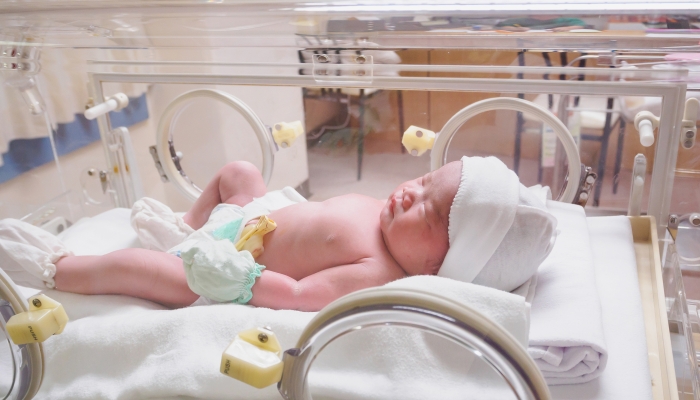
Do Preemies Sleep More Than Full-Term Babies?
Yes, preemies do sleep more than full term newborns. Talking straight numbers, premature babies will sleep as much as 22 hours a day. Compared to the 17 hours a day that full-term babies need, that’s quite a bit more!
While you won’t get to see much of those beautiful baby eyes in the early days, there’s no need to worry. In time your little one will start to have longer and more frequent wake periods. Rest assured, their continuous need for sleep at this point is what’s best for their overall health.
Why Do Preemies Need More Sleep?
Having left their cozy cavern too soon, preemies didn’t have time to fully develop. Their tiny bodies are performing tasks they weren’t quite ready for. Every feed. Every breath. Every movement. It’s much more than they were meant to do at that size.
According to Jinhee Park, Ph.D., RN in an article titled Sleep Promotion for Preterm Infants in the NICU published in 2020 by Nursing for Women’s Health, “Sleep disruption may have a negative effect on clinical outcomes, growth, and development.” This is why sleep is so important for preterm infants.
The extended rest times allow for continued development of many critical systems including:
- Immune System: When immature, it can lead to higher risk for infection.
- Cardiovascular System: Low blood pressure and defects become possible.
- Respiratory System: Underdeveloped lungs produce labored breathing.
- Gastrointestinal System: Potential for bowel issues and intestinal disease.
Note that these are just some of the most common under developments in premature babies. There’s other areas premature babies can struggle in like reflexes, metabolism, and more.
Should You Wake a Preemie to Feed?
You may have heard the adage “Never wake a sleeping baby.” It seems to make sense! They’re content and—let’s be honest—what exhausted parent wouldn’t want a bit longer to rest themselves? Unfortunately, this adage isn’t sound advice. You need to wake a sleeping baby; It’s vital to their growth.
For a premature baby these wake windows are especially important as they need all the nutrients they can get to further development. Keep in mind that early babies don’t cry a lot due to their underdevelopment. They may not show hungry cues in the same way full-term babies would. You’ll need to act as their barometer for when their little tummies need filling.
That said, most doctors suggest you feed a preemie no more than 4 hours apart with as many as 10 feedings per day. With how much more sleep they need than your average full term baby, waking them to feed is inevitable. Rest assured, though, by waking them to feed you’re doing what’s best for their long term health and wellness.
Tips to Help Preemies Have Good Sleep
I can imagine what you’re thinking at this point. I’m being told preemie sleep is important, but I’m also being told to wake them from sleep to feed. It can seem like a losing game and certainly not one conducive of good rest. Luckily, there are plenty of tips to help your preemie in getting good sleep along the way.
- Routine: You’d be hard pressed to find an article on baby sleep that doesn’t mention the importance of routine. A solid routine is the cornerstone of good sleep, acting as your baby’s cue it’s time to rest. Simple things like swaddling, rocking, and quiet time are easy and effective elements to incorporate.
- Baby Wearing: We’ve all been there, unable to soothe a fussy baby. Preemies can be a little harder to figure out too. Baby wearing (a form of contact napping) offers a great solution that provides closeness and comfort, also allowing the caregiver to remain hands-free. It’s the best of both worlds!
- Sleep Space: Many of the sleep space tips for babies born full-term still apply to preterm infants. For instance, a body temperature of 68 to 72 degrees, a firm mattress, clear of items, and regulated light. More importantly, preemies need a cozier resting space as large spaces can feel overwhelming to them.
- Days & Nights: Teaching your new baby the difference between day and night is imperative. Be sure during the day to have some noise, even if it’s low music or natural sounds. At night you’ll want to minimize the amount of light and overall contact if possible.
- Swaddling: Swaddles are an inexpensive tool that can have a huge impact on how your newborn sleeps. They act as a soothing mechanism and also lessen their ability for movement, keeping them from waking themselves too easily.
You’ll find that many sleep training methods use swaddles, so they’ll likely fit into whatever method you’ve already chosen.
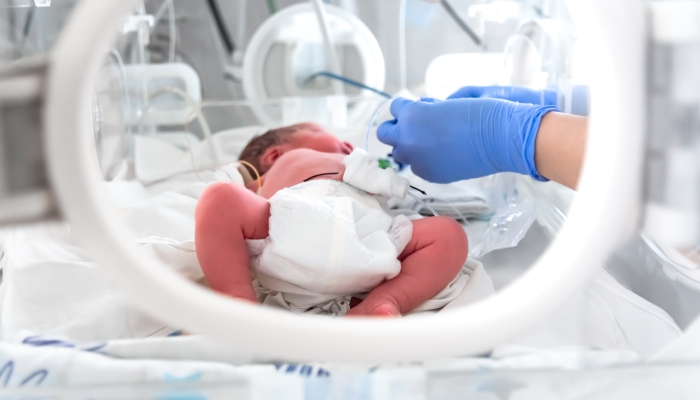
FAQ
What is a preemie’s “adjusted age”?
Also called the corrected age, the adjusted age of a premature baby is the baby’s chronological age subtracted by the number of weeks they were premature. For example, if your baby’s chronological age is 4 months old (16 weeks) but they were born 12 weeks early, your baby’s adjusted age is 3 months old.
Knowing their adjusted age is really helpful when it comes to tracking milestones. Preterm babies may appear behind in development when they’re actually performing on target with their adjusted age.
Do preemies have trouble sleeping?
A premature baby will sleep more but they’ll also have more sleep troubles. It’s incredibly hard for preterm babies to self-soothe due to their underdevelopment. That said, they may require more intervention in order to fall asleep.
Likewise, they tend to sleep more lightly; the lack of deep sleep equals a more easily disturbed baby. This makes regulating light and sound imperative. They also have shorter sleep cycles which creates very erratic sleep patterns overall.
When do preemies sleep through the night?
It’ll take more time for your preemie to sleep through the night. Preemies will take anywhere from 6 to 8 months to reach a full night of sleep. In comparison, a full term baby does this around the 4 month milestone. That can be a hard fact to hear, but remember—it’s only a season.
Is sudden infant death syndrome higher in preemie sleep?
Unfortunately, a premature infant is not only at higher risk for SIDS but also for a longer period of time. The good news is that there are plenty of precautions for concerned parents to take. For starters, letting your baby sleep in the same room as you drastically decreases the risk of SIDS.
Keeping their sleep space clear of blankets, toys, stuffed animals, and the like is also critical. Sleeping position is of high priority too. Your baby should be laid down on their back to sleep.
Why should my preemie sleep on their back?
It can be confusing for parents when they bring their preemie home and are told they’ve got to sleep on their backs. Afterall, they’ve just watched their infant spend days sleeping on their stomachs in the NICU.
Though it does help in promoting sleep, it was only meant for a time and while they were under professional supervision, unless your baby’s doctor tells you otherwise.
The back sleeping position is safest for preemies and greatly reduces the risk of SIDS. It might be tempting to do otherwise when they sleep so well on their stomachs, but the extra sleep is not worth the risk.

Related Posts
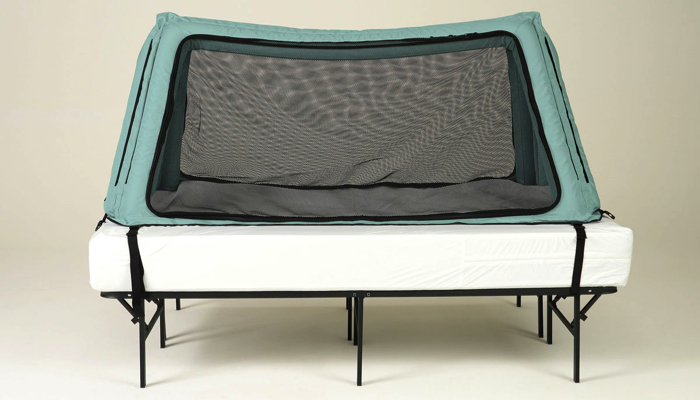
Sleep, Special Needs
Safe Place Bedding Travel Bed Review
Traveling with a special needs child can be stressful! Having a safe, durable, and easy to use travel bed can make traveling so much easier!
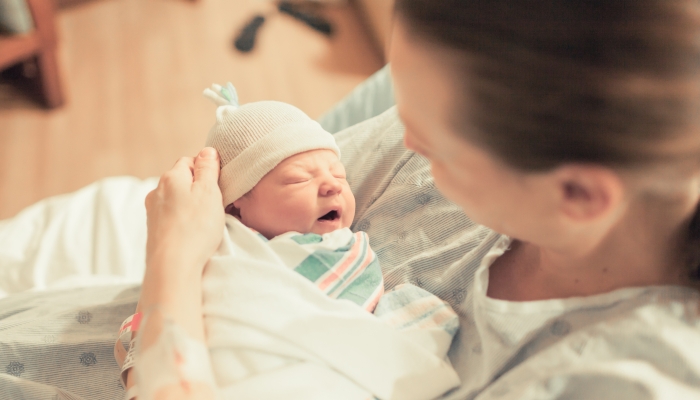
Sleep, Special Needs
Sleep Regimen for Premature Babies: Special Considerations
It can take premature babies much longer than their full-term peers to sleep for long stretches. A preemie sleep schedule may encourage better sleep.

Sleep
Mastering the Bedtime Routine: 3 Tips for a Peaceful Night’s Sleep
From around six weeks, a newborn bedtime routine can help your baby learn the difference between day and night and prepare for a restful night’s sleep.